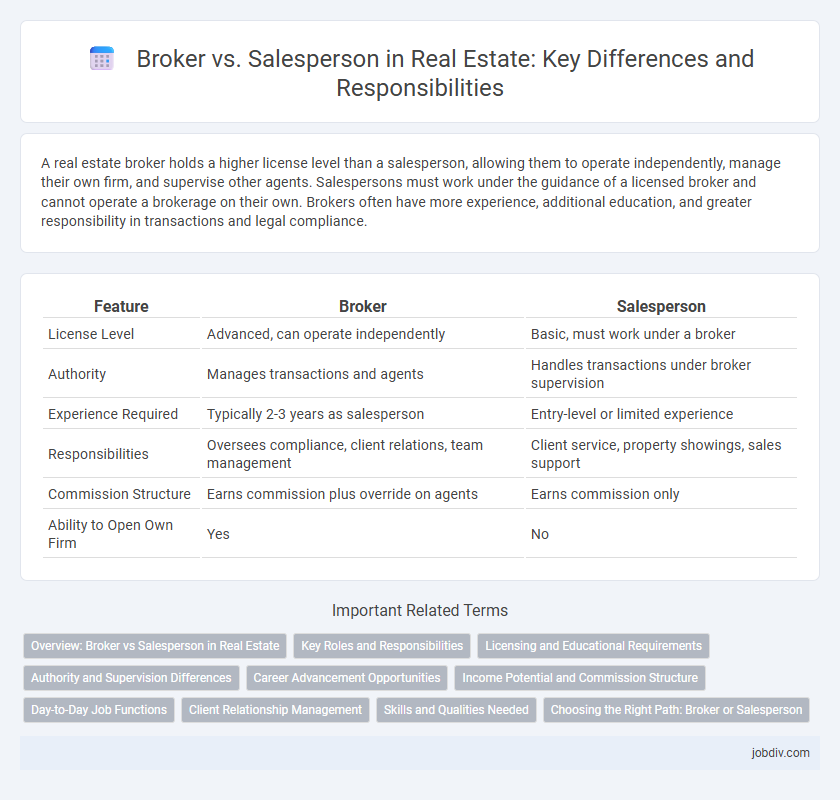A real estate broker holds a higher license level than a salesperson, allowing them to operate independently, manage their own firm, and supervise other agents. Salespersons must work under the guidance of a licensed broker and cannot operate a brokerage on their own. Brokers often have more experience, additional education, and greater responsibility in transactions and legal compliance.
Table of Comparison
| Feature | Broker | Salesperson |
|---|---|---|
| License Level | Advanced, can operate independently | Basic, must work under a broker |
| Authority | Manages transactions and agents | Handles transactions under broker supervision |
| Experience Required | Typically 2-3 years as salesperson | Entry-level or limited experience |
| Responsibilities | Oversees compliance, client relations, team management | Client service, property showings, sales support |
| Commission Structure | Earns commission plus override on agents | Earns commission only |
| Ability to Open Own Firm | Yes | No |
Overview: Broker vs Salesperson in Real Estate
In real estate, a broker holds a higher license allowing them to manage their own firm and supervise salespersons, who must work under a broker's supervision. Brokers typically have more education, experience, and regulatory responsibilities, including handling escrow funds and maintaining compliance with state laws. Salespersons primarily focus on assisting clients in buying, selling, or renting properties but cannot operate independently without a broker.
Key Roles and Responsibilities
Brokers typically hold a higher license level, granting them authority to own and operate real estate firms while supervising salespersons and managing complex transactions. Salespersons work under brokers, focusing on client representation, property showings, and negotiation to facilitate property sales or rentals. Brokers handle legal compliance, contract preparation, and office management, whereas salespersons concentrate primarily on direct client interactions and deal execution.
Licensing and Educational Requirements
A real estate broker typically requires more advanced licensing and educational qualifications than a salesperson, often including completion of additional coursework and passing a comprehensive broker's exam. Salespersons must obtain a license by completing pre-licensing classes and passing a state exam, but they operate under the supervision of a licensed broker. Brokers have the authority to manage their own real estate firm and supervise salespersons, while salespersons primarily focus on assisting clients with property transactions.
Authority and Supervision Differences
Brokers hold higher authority than salespersons, as they are licensed to operate independently and manage real estate transactions and offices. Salespersons must work under the direct supervision of a broker, lacking the legal capacity to perform transactions on their own. This hierarchy ensures brokers oversee compliance, contract management, and client protection, maintaining industry standards and regulatory adherence.
Career Advancement Opportunities
Broker positions offer greater career advancement opportunities compared to salespersons due to their ability to manage multiple agents and own real estate firms. Brokers typically earn higher commissions and can expand their income through brokerage fees and property management services. Salespersons often advance by gaining experience and obtaining a broker's license to unlock leadership roles and increased earnings potential.
Income Potential and Commission Structure
Real estate brokers typically earn higher income potential due to their ability to manage multiple agents and receive a portion of their commissions, whereas salespersons earn only from their individual sales. Brokers often have a more complex commission structure involving splits, desk fees, and overrides, while salespersons usually receive a straightforward percentage of the sales price. The expanded earning capacity for brokers comes from both direct sales commissions and residual income through agent performance.
Day-to-Day Job Functions
Brokers oversee real estate transactions, manage agents, and ensure compliance with legal regulations, often handling complex negotiations and contract reviews. Salespersons primarily focus on client interactions, property showings, and facilitating buyer-seller agreements under broker supervision. Brokers hold licenses that authorize them to operate independently, while salespersons work under a broker's guidance, concentrating on generating leads and closing sales.
Client Relationship Management
Brokers hold advanced licenses enabling them to oversee salespersons and manage complex client transactions, enhancing trust and long-term relationships. Salespersons focus on direct client interactions, executing transactions under broker supervision while building rapport and addressing immediate client needs. Effective client relationship management hinges on brokers' strategic oversight combined with salespersons' personalized service, ensuring client satisfaction and loyalty in real estate dealings.
Skills and Qualities Needed
Brokers require advanced knowledge in real estate laws, contract negotiations, and business management, demonstrating strong leadership and decision-making skills to oversee agents and manage brokerage operations effectively. Salespersons excel in communication, customer service, and local market expertise, focusing on building client relationships and facilitating property transactions. Both roles demand integrity, attention to detail, and the ability to adapt quickly to market trends to ensure successful real estate outcomes.
Choosing the Right Path: Broker or Salesperson
Choosing between a real estate broker and a salesperson depends on your career goals and licensing requirements, as brokers typically hold higher licenses allowing them to operate independently and manage other agents. Salespersons must work under a broker's supervision but can focus on client interactions and property transactions without the administrative responsibilities of a broker. Understanding state-specific regulations and the commitment needed for education and experience can help determine the best path in the real estate industry.
Broker vs Salesperson Infographic

 jobdiv.com
jobdiv.com